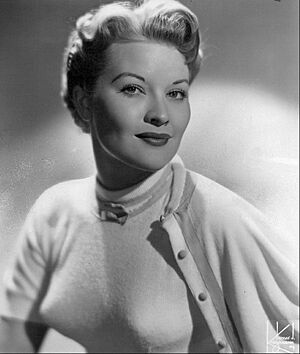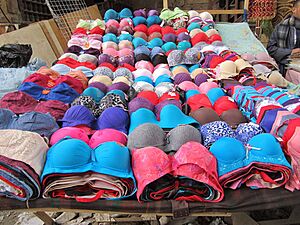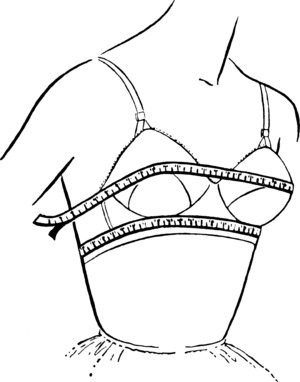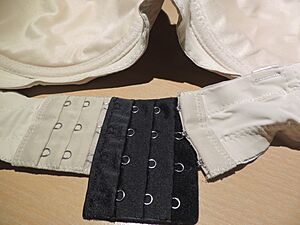Brassière facts for kids
A bra (short for brassiere) is an undergarment worn by women to support their breasts. Bras come in many different shapes, sizes, and styles. They are designed to provide comfort, support, and sometimes to shape the body.
Contents
Why Do People Wear Bras?
People wear bras for several reasons. One main reason is for support. Breasts are made of soft tissue and can move a lot during daily activities or exercise. A bra helps to hold them in place, which can make physical activity more comfortable.
Another reason is comfort. For some, wearing a bra can prevent discomfort or pain, especially for those with larger breasts. Bras can also help reduce bouncing.
Bras can also be a matter of fashion or personal preference. Different bra styles can be worn under different types of clothing to create a smooth look or to enhance an outfit.
A Brief History of Bras
For a long time, women wore tight garments called corsets to shape their bodies. Corsets were often uncomfortable and restrictive.
In the late 19th and early 20th centuries, people started looking for more comfortable options. The modern bra began to appear around this time. One of the earliest patents for a "brassiere" was granted in 1914 to an American woman named Caresse Crosby. She created a simpler, softer garment using two handkerchiefs and ribbon.
Over the years, bras have changed a lot. During the 1920s, bras were often designed to flatten the chest. In the 1930s, cup sizes (like A, B, C) were introduced, making it easier to find a better fit. New materials and designs have continued to make bras more comfortable and supportive.

Finding the Right Bra Size
Wearing the correct bra size is very important for comfort and support. A bra that is too small can feel tight and uncomfortable. A bra that is too big might not offer enough support.
Bra sizes usually have two parts: a band size (a number like 32, 34, 36) and a cup size (a letter like A, B, C, D).
- The band is the part that goes around your ribcage, just under your breasts. It should fit snugly but not too tightly.
- The cups are the parts that hold your breasts. They should fit smoothly without any gaps or spilling over.
Many stores offer fitting services to help people find their correct size. It's a good idea to get measured regularly, as body shapes can change over time.
Types of Bras
There are many different types of bras, each designed for specific needs or clothing styles:
- Everyday bras: These are common bras designed for daily wear, offering basic support and comfort.
- Sports bras: These bras are made for physical activity. They offer extra support to reduce movement during exercise.
- Bralettes: These are softer, often wire-free bras that focus more on comfort and style. They are usually less structured than traditional bras.
- Push-up bras: These bras have padding to lift and enhance the shape of the breasts.
- Strapless bras: These bras are designed to be worn without shoulder straps, often for outfits like dresses or tops that show the shoulders.

Images for kids
See also
 In Spanish: Sostén para niños
In Spanish: Sostén para niños




